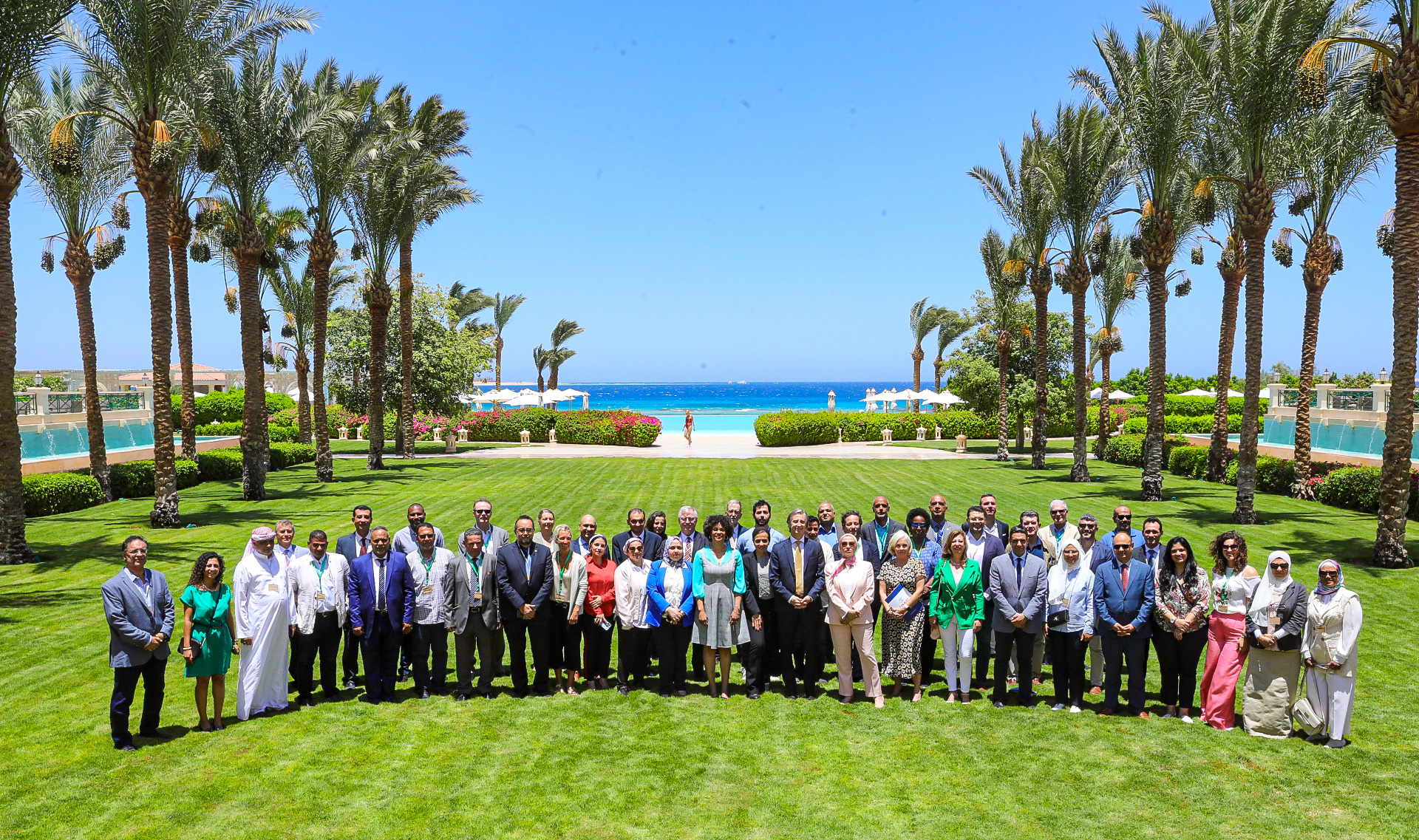Safeguarding Egypt’s Red Sea coral reefs takes center stage in Hurghada
June 21, 2023

20 June – Hurghada, Egypt – The first of many consultative workshops was held today in Hurghada as international partners, the Ministry of Environment and Ministry of International Cooperation kick off the Egyptian Red Sea Initiative.
The Ministry of Environment and Ministry of International Cooperation, in collaboration with the United States Agency for International Development (USAID), the United Nations Development Programme (UNDP), and the Global Fund for Coral Reefs (GFCR) held their first consultation workshop today to discuss joint efforts to conserve Egypt’s Red Sea coral reefs.
In attendance were H.E. Minister of Environment, Dr. Yasmine Fouad; Minister of International Cooperation H.E. Dr. Rania A. Al- Mashat (via video statement); Red Sea Governor, General Amr Hanafy; UNDP Egypt Resident Representative, Alessandro Fracassetti; and USAID Mission Director in Egypt, Leslie Reed Representatives from NGOs, private sector partners, and local communities also joined.
The Egyptian Red Sea Initiative (ERSI), officially announced at COP27 in November 2022 with an initial pledge of up to $15 million from USAID, will focus on combating climate change and its devastating impacts on the Red Sea’s coral reefs.
From her side, Minister of Environment H.E. Dr. Yasmine Fouad emphasized the significance of natural reserves in achieving the vision of sustainable management of natural resources. She highlighted that “The consultative workshop on the Red Sea initiative for coral reefs is a crucial component of Egypt's commitment to addressing global challenges. Egypt, as the presiding country of the COP27 Climate Conference, has prioritized biodiversity and positioned it at the core of the conference. This strategic focus serves as a pivotal milestone towards the COP15 Conference on Biological Diversity, ensuring a sustainable future for generations to come and fulfilling our global commitment to shaping the international framework for biodiversity beyond 2020.”
Minister of International Cooperation H.E. Dr. Rania A. Al-Mashat said “Climate change and the challenges that come with it, require collaborative action with all stakeholders. Launched at COP27, the Egyptian Red Sea Initiative (ERSI) is a perfect example, setting the scene for cooperation between many development partners including USAID, UNDP, GFCR, national entities, private sector and NGOS; aiming to strengthen Egypt’s ability to adapt to and mitigate against the economic, environmental, and social impacts of climate change by working to preserve coral reefs and its surrounding coastal ecosystem; a national gem and tourist attraction for many.”
Red Sea Governor General Amr Hanafi emphasized the crucial role of coral reefs in supporting biological diversity and serving as a vital food resource for marine life. He highlighted their significance saying that “Coral Reefs are an important source of tourism and coastal protection, and there is an urgent need to preserve and protect them from any potential threats, be it natural or human-induced, recognizing them as a valuable economic asset that must be safeguarded.”
USAID Mission Director Leslie Reed said, “Over the last 40 years, the U.S. Government, through USAID, has invested over $300 million to protect Egypt’s natural resources and build resilience in Egypt against climate change. But our work is not done! USAID believes this is the decisive decade for our planet, and that the time to act is now. The new Egyptian Red Sea Initiative promotes high-value, low-environmental impact ecotourism and extends a multi-faceted, holistic approach to the conservation of the Red Sea’s coastal ecosystem. The U.S. Government is proud to partner with the Government of Egypt, the Global Fund for Coral Reefs, the United Nations Development Programme, and members of the private sector to launch this major initiative into action and preserve this natural treasure for generations to come.”
“Pivotal to people, the planet, and prosperity, the reefs are facing rising sea temperatures, overfishing, and damage due to waste runoff. There is an acute urgency to protect the Red Sea coral reefs”, said UNDP Egypt Resident Representative Mr. Alessandro Fracassetti.
Participants in the workshop also discussed the importance of green investments. The ERSI will help with small grants and blended finance, looking to support everything from small-scale solar systems, to larger waste-water treatment facilities and renewable energy resources.
“Scientists warn that if climate change continues unabated, we will lose 99 percent of the world’s coral reefs, making the preservation of the Red Sea's coral reef of utmost importance globally,” Mr. Fracassetti said. “By joining forces with our partners and investing in blended finance mechanisms, we can preserve these invaluable ecosystems, safeguard livelihoods, enhance sustainability, and protect these natural treasures that enrich our world.”
The Red Sea's coral reef spans over 4,000 kilometers of coastline and is a critical source of income and food for a rapidly growing population of over 28 million people living along the Red Sea.
“In addition to be astonishingly beautiful and supporting millions of Egyptian people, the coral reefs in Egypt’s Red Sea are globally significant due to their remarkable resilience to climate change impacts.” said Yabanex Batista, Deputy Head of the Global Fund for Coral Reefs (UN Grant Fund). The Global Fund for Coral Reefs is committed to building a transformative partnership with local coastal communities, the Government of Egypt, UNDP, and USAID to ensure the Egyptian Red Sea Initiative brings sustainable benefits for the resilience of Egypt’s coral ecosystems and communities alike.”
The ERSI aligns with the Government of Egypt's Climate Change Strategy 2050, which focuses on promoting sustainable economic growth and enhancing adaptive capacity.
For media inquiries and further information, please contact:
USAID: cairomedia@usaid.gov
UNDP: Noran Said, Communication Coordinator at noran.said@undp.org

 Locations
Locations



